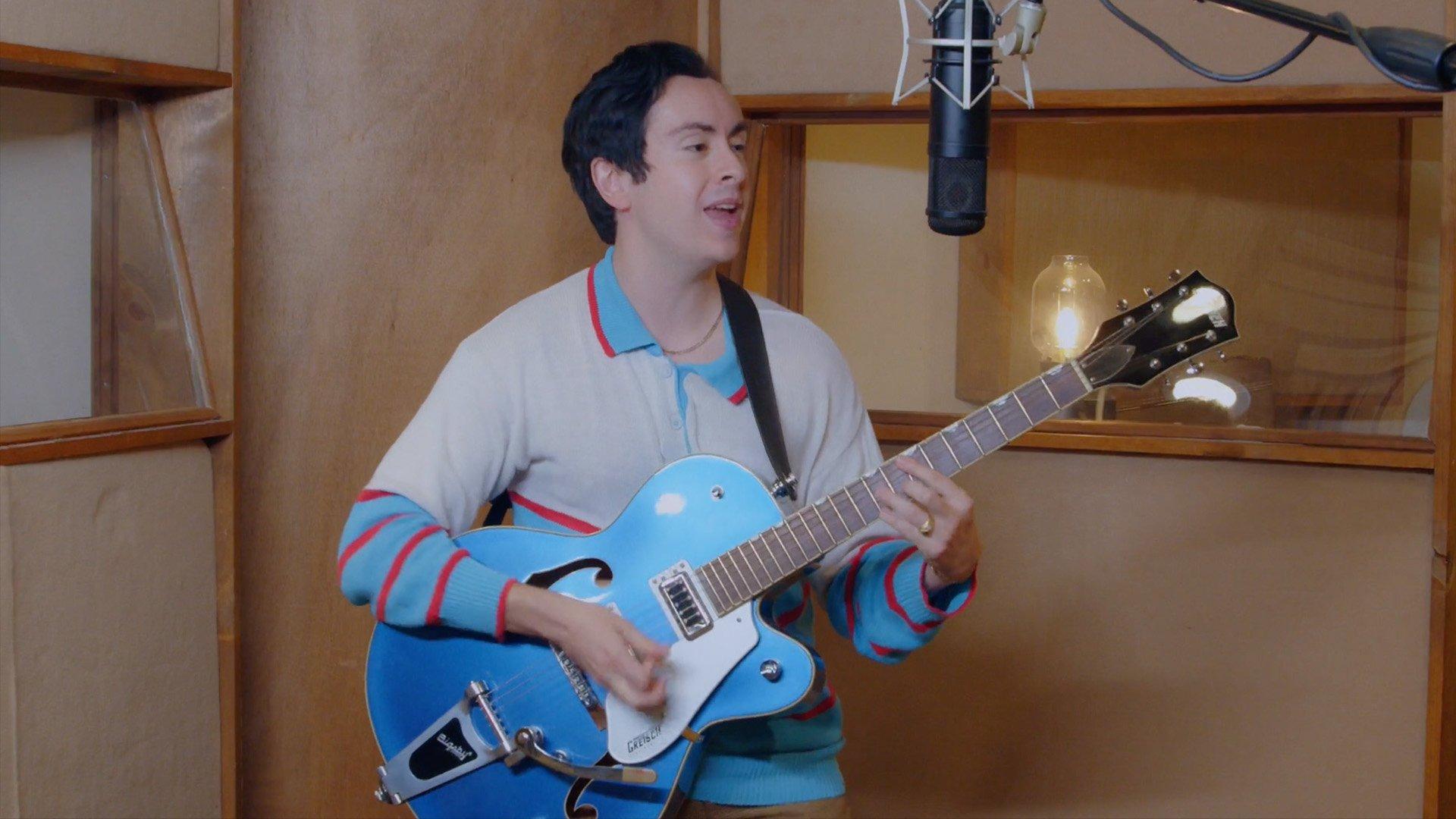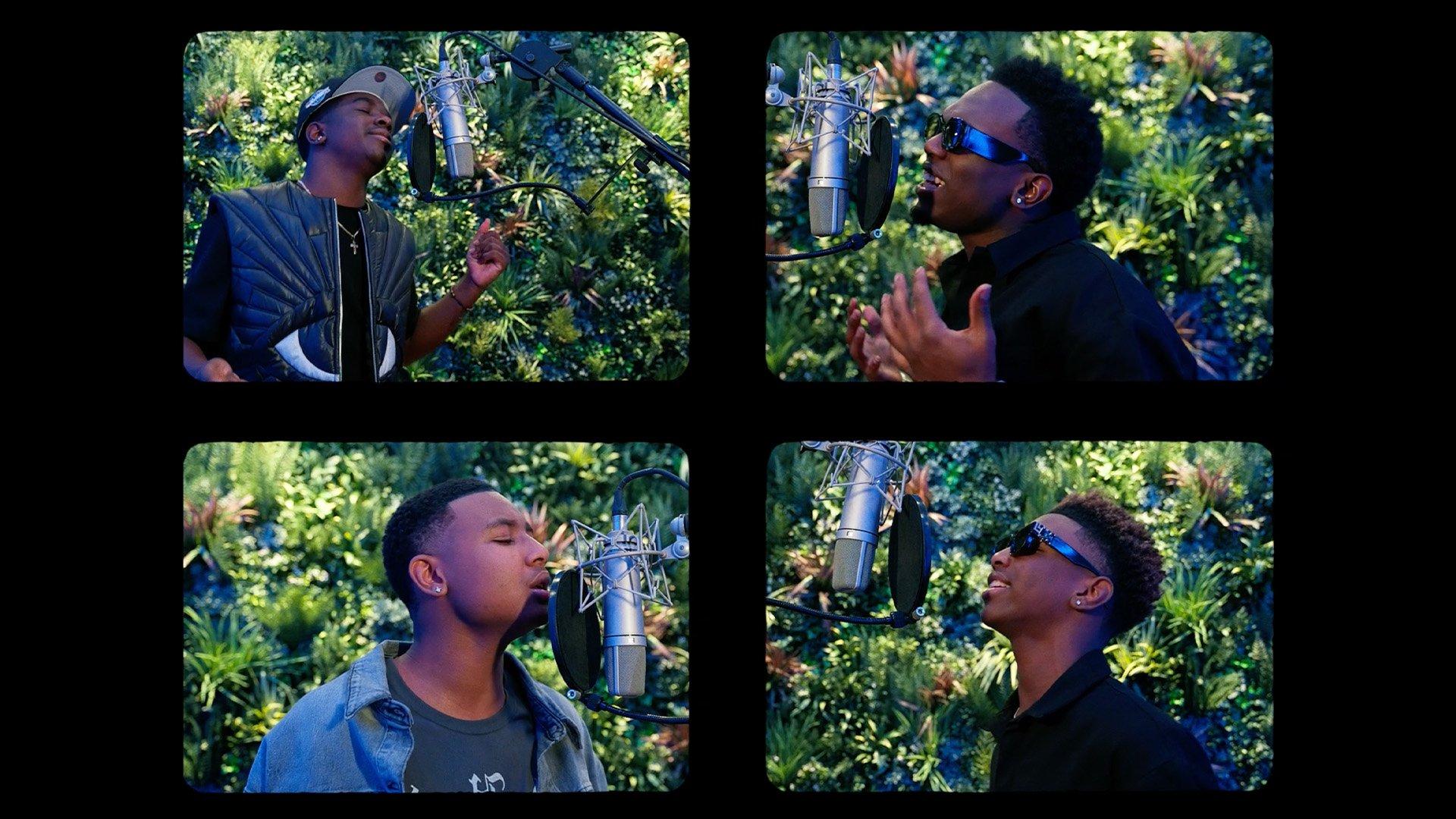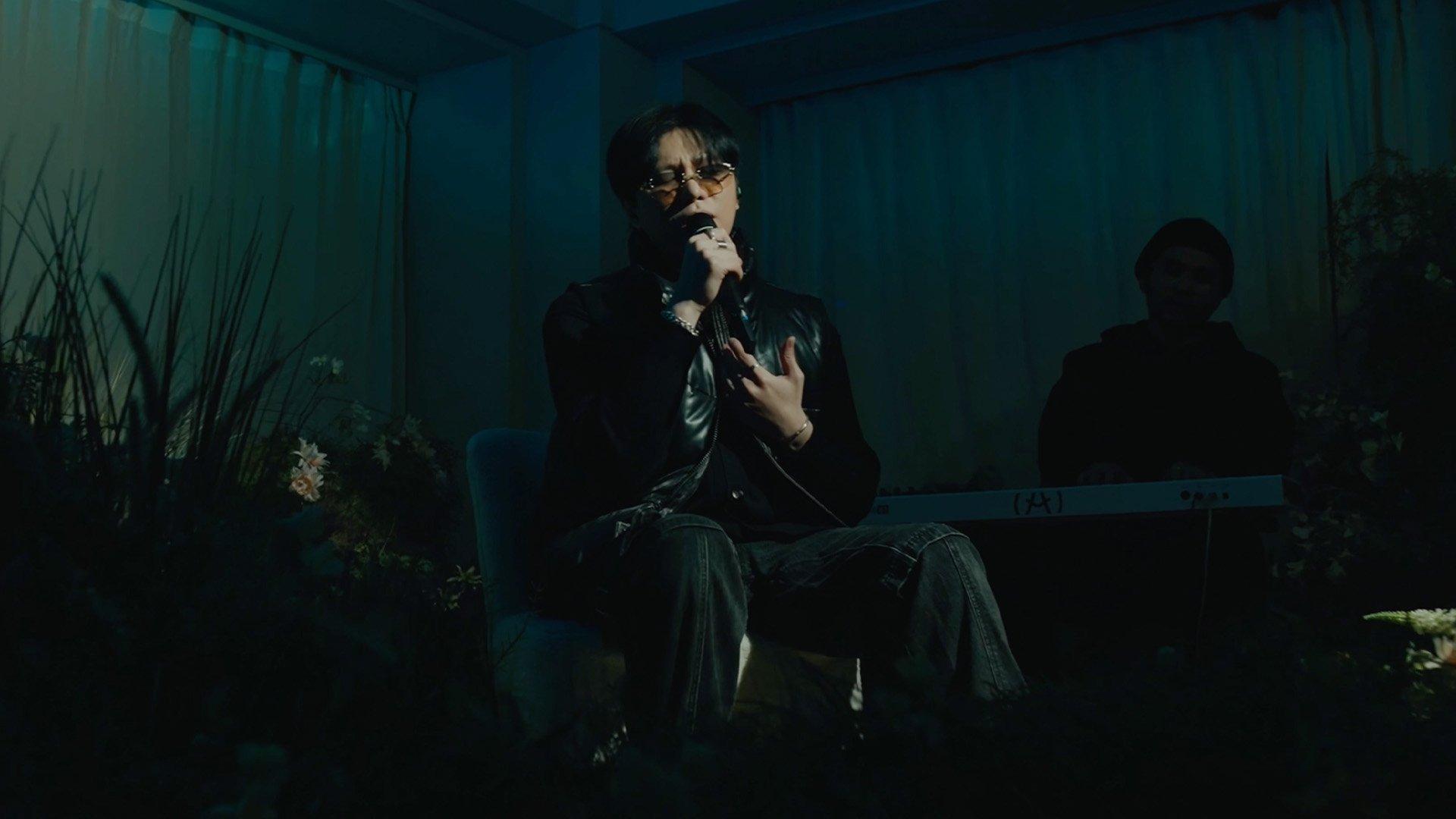Photo: Courtesy of Where the Waters Meet

video
ReImagined: Brand-New Irish Duo Where The Waters Meet Debut With A Shimmering Cover Of Kim Carnes' "Bette Davis Eyes"
In their first-ever performance as a duo, Irish singer/songwriter Megan O'Neill and multi-instrumentalist Paul Kenny — known together as Where The Waters Meet — deliver a stirring rendition of Kim Carnes' GRAMMY-winning hit from 1981.
After years of making music separately, Irish singer/songwriter Megan O'Neill and drummer/multi-instrumentalist Paul Kenny are now joining forces as a new duo called Where the Waters Meet. The pair — who are also a real-life couple — launch their career together with a rendition of "Bette Davis Eyes," a 1981 hit by Kim Carnes that won Record of the Year at the 1982 GRAMMY Awards.
In this episode of ReImagined, O'Neill and Kenny set the scene in a log cabin, the interior aglow with warm lighting and twinkling tea lights strung along the wall. They face each other as they sing, creating an intimate connection as Kenny performs on a groovebox and O'Neill plays a keyboard.
Where the Waters Meet’s stripped-back performance puts O'Neill's voice at the center. Her smooth, wistful lead vocal line takes listeners on an impassioned journey through "Bette Davis Eyes," reflecting every layer of glamour, loneliness and soaring sweetness of the song's nuanced storyline.
Though this is their first performance at the cabin as an official duo, O'Neill has recorded several songs there for her "Live at the Log Cabin" video series — featuring Kenny as part of her band in at least two installments.
The studio version of Where the Waters Meet’s performance arrives November 25. Follow them on social media to hear the latest news about their new music, and keep checking back to GRAMMY.com for more new episodes of ReImagined.

Photo: Courtesy of Dylan Chambers
video
ReImagined: Watch Dylan Chambers Channel Bruno Mars In This Groovy Cover Of "Uptown Funk"
Pop-soul newcomer Dylan Chambers offers his rendition of "Uptown Funk," Mark Ronson and Bruno Mars' infectious 2014 hit.
In the latest episode of ReImagined, soul-pop newcomer Dylan Chambers delivers a fresh, heartfelt take on "Uptown Funk", using an electric guitar to drive the performance.
In the year of its inception, Mark Ronson and Bruno Mars' "Uptown Funk" quickly made strides across the map, from a No. 1 peak on the Billboard Hot 100 to a Record Of The Year and Best Pop Duo/Group Performance win at the 2014 GRAMMYs. Ten years after its release, it is the ninth most-viewed YouTube video of all-time and was named one of Billboard's "Songs That Defined The Decade."
Chambers named Mars as one of his most influential inspirations and praised Silk Sonic's Las Vegas residency as one of the "greatest concerts" he has attended in an interview with Muzic Notez.
"Don't believe me, just watch," Chambers calls in the chorus, recreating its notable doo-wop ad-libs with the strums of his instrument.
Chambers dropped his latest single, "I Can Never Get Enough" on April 10, following his March release "High (When I'm Low)." Both tracks will be a part of his upcoming EP, For Your Listening Pleasure!, out May 17.
Press play on the video above to watch Dylan Chambers' groovy rendition of Bruno Mars & Mark Ronson's "Uptown Funk," and check back to GRAMMY.com for more new episodes of ReImagined.

Photo: Courtesy of WanMor
video
ReImagined: Watch WanMor Deliver A Melodic Cover Of Silk Sonic's "Leave The Door Open"
Sibling quartet WanMor perform a soulful rendition of "Leave the Door Open," the track that helped Silk Sonic make a "clean sweep" at the 2022 GRAMMYs.
In 2022, Bruno Mars and Anderson .Paak had a memorable GRAMMYs night together as Silk Sonic. As .Paak declared on stage, they made a "clean sweep," winning every category in which they were nominated: Best R&B Song, Best R&B Performance, Record Of The Year and Song Of The Year. And it was all thanks to their smash "Leave the Door Open."
In this episode of ReImagined, R&B newcomers WanMor perform a smooth cover of the iconic track. Against a lush greenery backdrop, the foursome each take turns at the mic and come together for some silky harmonies.
"I'ma leave the door open girl/ That you feel that I feel/ And you want me like I want you tonight, baby/ Tell me that you're coming through," they croon with the same swagger Silk Sonic possessed in the 2021 single.
WanMor consists of the four sons of Boyz II Men's Wanyá Morris, with their moniker paying homage to their father's first and last names. Individually, they go by the stage names Big Boy, Chulo, Tyvas, and Rocco.
On March 29, the sibling quartet released their latest project, Alone With You — which also featured their previous singles "BABY" and "Please Don't Go" — via Beautiful Life Productions, Mary J. Blige's 300 Entertainment imprint.
Press play on the video above to watch WanMor's groovy rendition of Silk Sonic's "Leave the Door Open," and check back to GRAMMY.com for more new episodes of ReImagined.

Photo: Courtesy of LØLØ
video
ReImagined: LØLØ Flips Green Day's "Boulevard Of Broken Dreams" Into An Acoustic Jam
Canadian pop-punk singer LØLØ offers a stripped-down rendition of "Boulevard of Broken Dreams," the GRAMMY-winning smash from her childhood inspirations, Green Day.
Almost exactly two decades ago, Green Day traced the story of a lonely teenager, Jesus of Suburbia, in their seventh album, American Idiot. Its most notable chapter, "Boulevard of Broken Dreams," earned the band Record Of The Year at the 2006 GRAMMYs.
In this episode of ReImagined, Canadian pop-punk singer LØLØ delivers her take on the song, an ethereal acoustic version.
LØLØ is a longtime fan of Green Day. In an interview with Kerrang! magazine, she recalled their single "Good Riddance (Time of Your Life)" as the first song she learned to play. She later told idobi Radio that her 2023 track "omg" was "a bunch of intrusive thoughts jumbled into a song, wondering if I will ever be enough, or ever be as cool as Green Day."
This year, LØLØ released two original singles, "poser" and "2 of us," via Hopeless Records.
Press play on the video above to hear LØLØ's fresh rendition of "Boulevard of Broken Dreams," and check back to GRAMMY.com for more new episodes of ReImagined.
Green Day's 'Saviors': How Their New Album Links 'Dookie' & 'American Idiot' Decades Later

Photo: Courtesy of Gen Neo
video
ReImagined: Gen Neo Delivers A Lo-Fi Cover Of Seal's "Kiss From A Rose"
Singaporean R&B singer/songwriter Gen Neo offers a sultry take on Seal's three-time GRAMMY-winning hit, "Kiss from a Rose."
In 1994, Seal's completely self-written "Kiss from a Rose" won him the first GRAMMYs of his career for Best Male Pop Vocal Performance, Song Of The Year, and Record Of The Year.
Nearly 30 years later, Singaporean songwriter Gen Neo takes a turn at the microphone with a synth-driven rendition of the romantic track for the latest installment of ReImagined.
"Baby, I compare you to a kiss from a rose on the gray/ The more I get of you, stranger it feels," Gen Neo sings in the iconic chorus. "And now that your rose is in bloom/ A light hits the gloom on the gray."
Much like Seal, Gen Neo has written the majority of his solo tracks. He also has an extensive list of songwriting credits for K-pop artists like Henry Lau, f(x), Super Junior, Eric Nam, and more.
Gen Neo has continuously released singles since 2023, including "Same Mistakes," "Unless We Try," and "Stay." His most recent track, "KISS&TELL," which dropped on Feb. 23, is a collaboration with fellow Singaporean R&B singer Ethan Low.
Press play on the video above to hear Gen Neo's cover of Seal's "Kiss from a Rose," and check back to GRAMMY.com for more new episodes of ReImagined.
11 Rookie K-Pop Acts To Know In 2024: NCT Wish, RIIZE, Kiss Of Life & More
